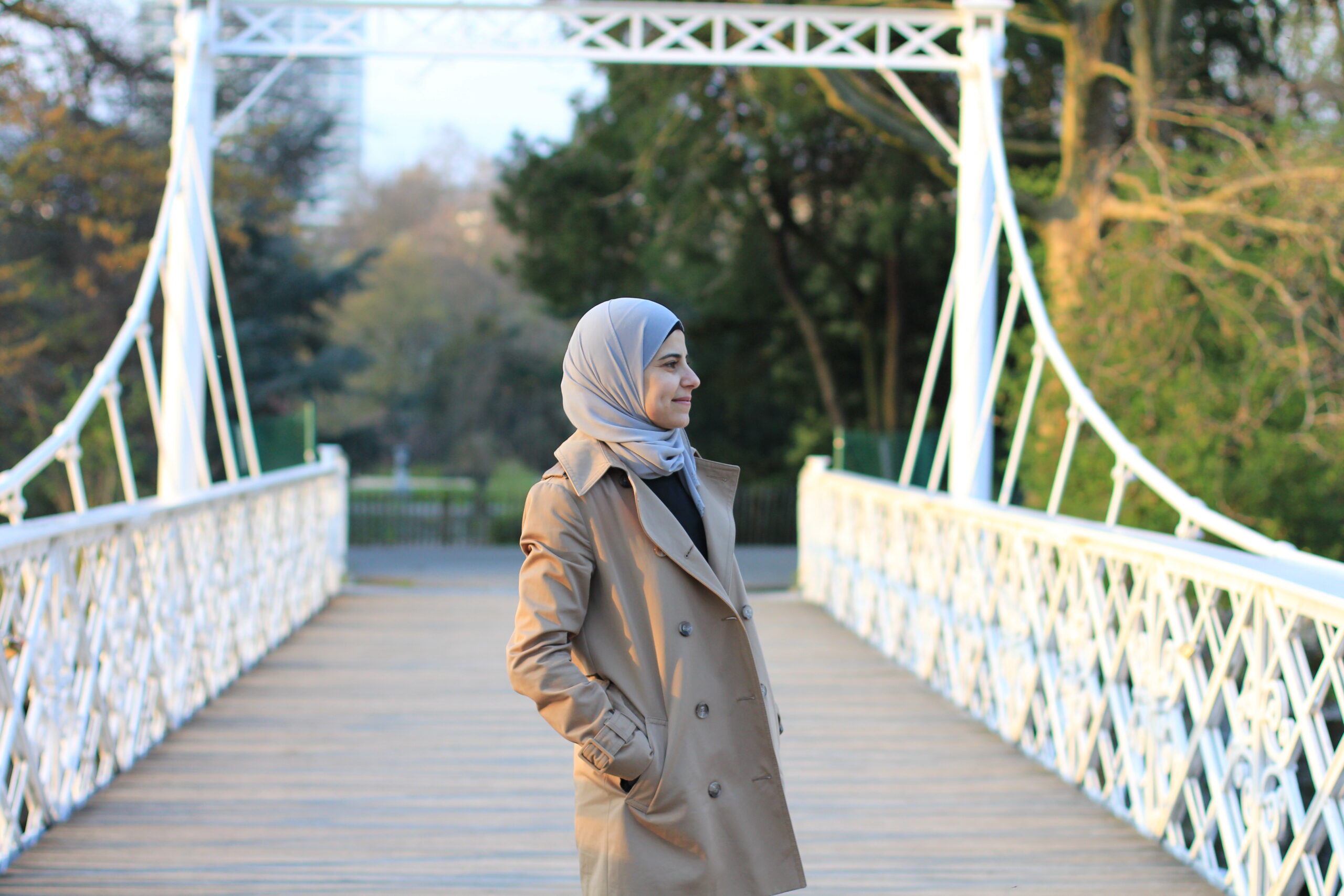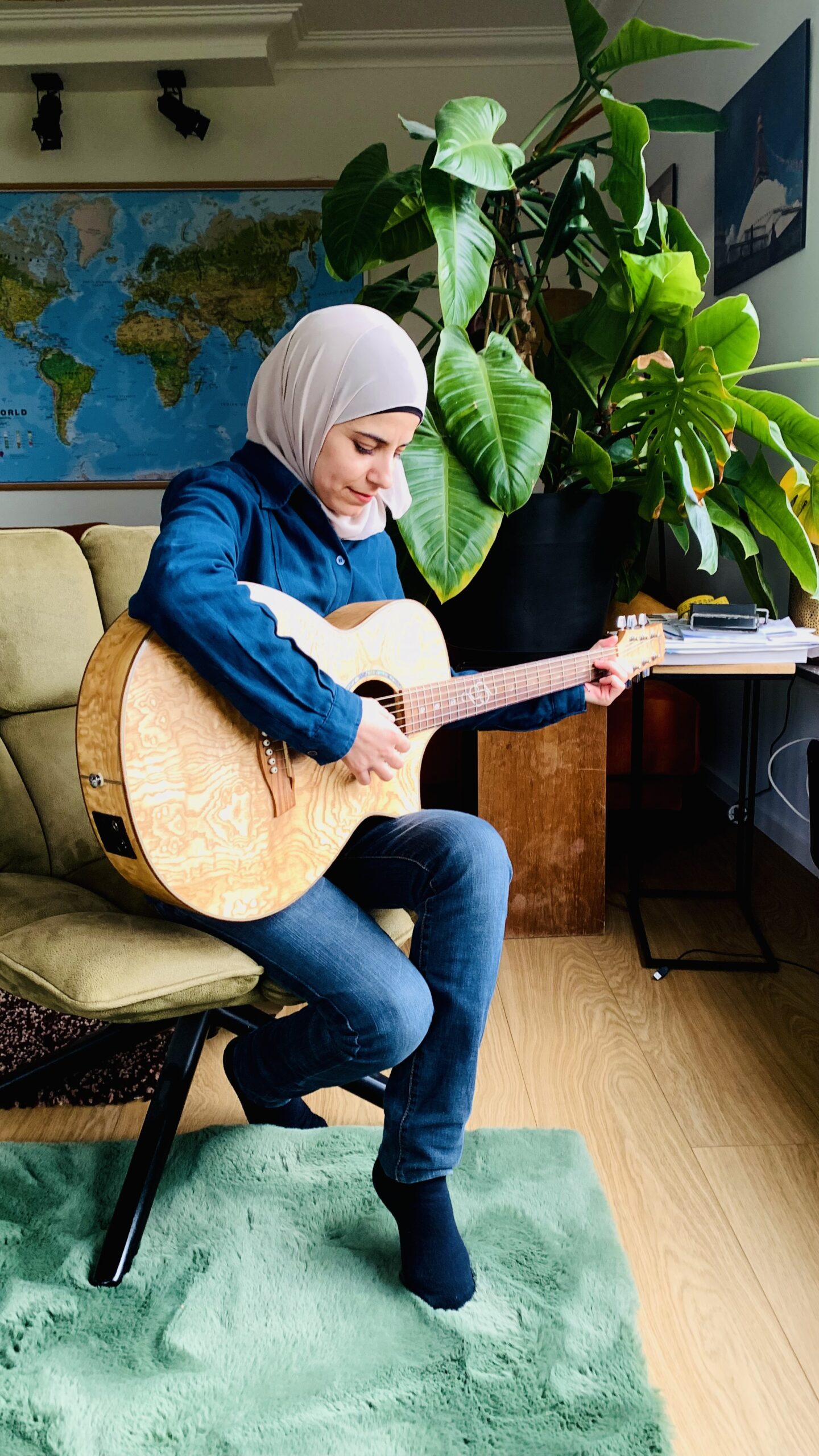University lecturer. Researcher. Women in Tech Ambassador.
Saja did not succeed by accident. She succeeds by moving forward. Always forward.
Dive into her world of AI, inclusion, and making every moment count.
Bio
Saja Tawalbeh is a lecturer, researcher, and PhD candidate originally from Jordan, now based in Belgium. With a background in artificial intelligence, particularly natural language processing, she is deeply involved in AI research and the development of explainable AI as a senior researcher.
Saja is also an advocate for inclusivity and diversity in the tech industry, serving as a Women in Tech Ambassador for Clusity, a community dedicated to fostering inclusion in the field.
Since moving to Belgium in 2020, she has balanced her role as a lecturer in Applied Computer Science at the University of Applied Sciences & Arts (KdG) with her PhD studies and active community engagement.

The Conversation
Thanks for joining me today, Saja. Let’s start by having you briefly introduce yourself. Who are you, and what do you do?
Saja: Thank you for having me! My name is Saja Tawalbeh, originally from Jordan, where I lived until I moved to Belgium by the end of 2020 to pursue my PhD. I received my bachelor’s in computer science in Jordan. Then, I completed my master’s in AI, specifically in natural language processing, and worked as a research assistant in the same area for two years at Jordan University of Science and Technology. Currently, I’m a lecturer in the Department of Applied Computer Science at the University of Applied Sciences & Arts (KdG). I’m pursuing my Ph.D. in Explainable Artificial Intelligence (XAI) at the Faculty of Science, University of Antwerp, sqIRL/IDLab, Imec. Additionally, I’m also an ambassador for a community in Belgium called Clusity, which focuses on inclusion and diversity.
That’s impressive! With so much on your plate, do you have any hobbies or free time activities?
Saja: Yes! I’m passionate about photography, playing chess, and exploring new places on long walks, which helps me feel more connected to the world around me. Walking also proves to be an excellent way to brainstorm new ideas or troubleshoot research-related challenges. Finally, if I’m working from home, I enjoy playing music and taking dance breaks, which adds a fun and refreshing balance to my day.

Going back to your journey, what led you to choose your field of study?
Saja: It all actually happened by accident! I initially intended to study mathematics, but my GPA didn’t meet the program requirements, so I was accepted into the computer science program instead. That’s where it all began. Once I started, I was fascinated by how you can translate thoughts into code and bring ideas to life on a computer. This experience sparked my passion for research, and now every research project energizes me; I’m always curious about each one. For me, it’s truly fulfilling! Additionally, going deeper into the inner workings of AI algorithms and understanding their complexity makes the field even more interesting and enjoyable. It is completely amazing how we could build transparency between these algorithms and humans.
Can you explain your work and its purpose to someone who isn’t familiar with your field?
Saja: This may be challenging to explain simply! In essence, the purpose of my work is to train AI systems for classification tasks. For example, if you have an image of a cat, you would input this image into an AI model trained to distinguish between images of cats and dogs. The AI model would then predict whether the image is of a cat. My research, however, goes beyond prediction: it focuses on understanding the process behind the system’s decision. Specifically, what information the AI considers when arriving at its prediction. In other words, my work focuses on how AI learns and makes decisions. I would like to add that I am most focused on AI networks that are designed to be understandable from the beginning.
So you’re teaching and conducting research. What’s your teaching style, and what message do you want to convey?
Saja: My teaching style is supportive. I would like to support each student. I’ve faced many difficulties in my journey and often didn’t receive the support I needed. So, when I teach, I am willing to give students the encouragement they sometimes lack. I see that many students doubt themselves and fear the future. My message is simple: don’t be afraid of what lies ahead. Enjoy the present and focus on what you’re doing right now. If something challenging happens, it’s an opportunity to grow and become stronger. There is a saying that I like. What doesn’t break us, makes us stronger.
That’s a beautiful message. Can you share some of the challenges you faced during your studies or professional journey?
Saja: Moving abroad was a huge challenge in itself. I literally faced many challenges in the past 3 years in Belgium. I won’t go into all the details, but I’m grateful to have a strong support network (friends/colleagues) that helped me overcome these challenges. I’m surrounded by supportive people, especially at the University of Antwerp, which has offered me an incredible environment to move on. I am also especially thankful to the founders of Clusity who have always supported me through challenging times.
What do you think contributes to creating such a supportive environment?
Saja: I believe diversity is key. When people from different backgrounds, experiences, and perspectives come together, they bring a range of ideas and approaches to problem-solving. In my opinion, this has a positive impact on the working environments
And in your field, which is so technical and often male-dominated, how do you see that changing? What would make women feel more encouraged and confident to join the tech world?
Saja: That’s interesting, because in Jordan, there’s already a strong presence of women in tech—over 60%, actually. However, when I came to Belgium, I noticed a different dynamic; there are very few women in the lab or in the IT domain in general. I believe building supportive communities is essential, as these can encourage women, encouraging their capability and helping them feel that they truly belong in this field.
What drives your motivation? What qualities keep you pushing forward?
Saja: My greatest motivation is my Mom—I want to make her proud and see her eyes light up when she sees my achievements. For me, consistency is also a big part of it. I know that if I keep working on something, I will get there eventually. That’s really all it takes. I totally believe that if you put your mind to something, you will get it. Moreover, I like challenges, therefore, I challenge myself by learning all the time. To me, learning is the life.
You have such a positive mindset! Have you always been like this, or is it something you developed over time?
Saja: I think I’ve always been this way. Hoover, I believe this can evolve as life goes on. I’m just naturally stubborn about things, whether it’s my work, my research, or my relationships. Once I set my mind to something, I won’t give up easily.

You’ve already achieved so much—what’s next for you? What are your ambitions moving forward?
Saja: I plan to continue with research and teaching. Research is my passion, and I want to stay in academia to inspire students and help them to believe in themselves. They should know that we are capable of doing anything. That’s my plan for the next few years—just keep doing what I love and hope it makes a positive impact.
It sounds like you’ve found your place. It’s not always easy to manage work-life balance in demanding fields. Do you have routines or principles that help you keep work separate from your personal life?
Saja: It depends. Sometimes, we have deadlines that require working day and night, but that’s usually only once or twice a year. I’ve stopped working on weekends, except during these intense deadline periods. As a new teacher, I feel I need to spend more time working, but I make sure to recharge afterward by going for a walk, meeting friends, cooking, or reading. Sometimes, I prefer to spend the weekend alone, just taking a book to a park or by the riverside to relax.
What’s your favorite aspect of your work?
Saja: My favorite part is the deep understanding we gain about AI systems. It’s not just about training AI or classifying things; it’s about really understanding how these AI systems work. How or what do they learn and why they are making that specific decision.
And what advice would you give to someone considering a career in this field or in academia?
Saja: My advice is simple—don’t give up on yourself. Academia involves a lot of rejections. You might submit papers and get rejected many, many times, and that rejection isn’t the end; it should make you stronger. Don’t let it break you; just keep pushing.
Here’s a fun question: if you could switch jobs with anyone for a day, what would you choose?
Saja: Photography! I love photography, so if I could switch, I’d love to experience a day as a photographer.
What is it that you would like people to know about your country and its culture?
Saja: Well, I think when most people think of Jordan, the first thing that comes to mind is Petra, which is a stunning ancient city carved into the rock. But today, I really want to focus on the people of Jordan, because that’s what truly makes our country special. We are known for our hospitality, and for us, a guest is not just a visitor—they are treated like family. It’s a deep part of our culture to share meals and make sure that our guests feel completely at home. We take pride in making people feel comfortable and welcomed, and we believe that having guests brings blessings to our homes. For me, that’s the heart of Jordanian culture.
Connect with Saja
If you wish to connect with Saja and learn more, seek advice, or share similar experiences, feel free to reach out to her via LinkedIn.
